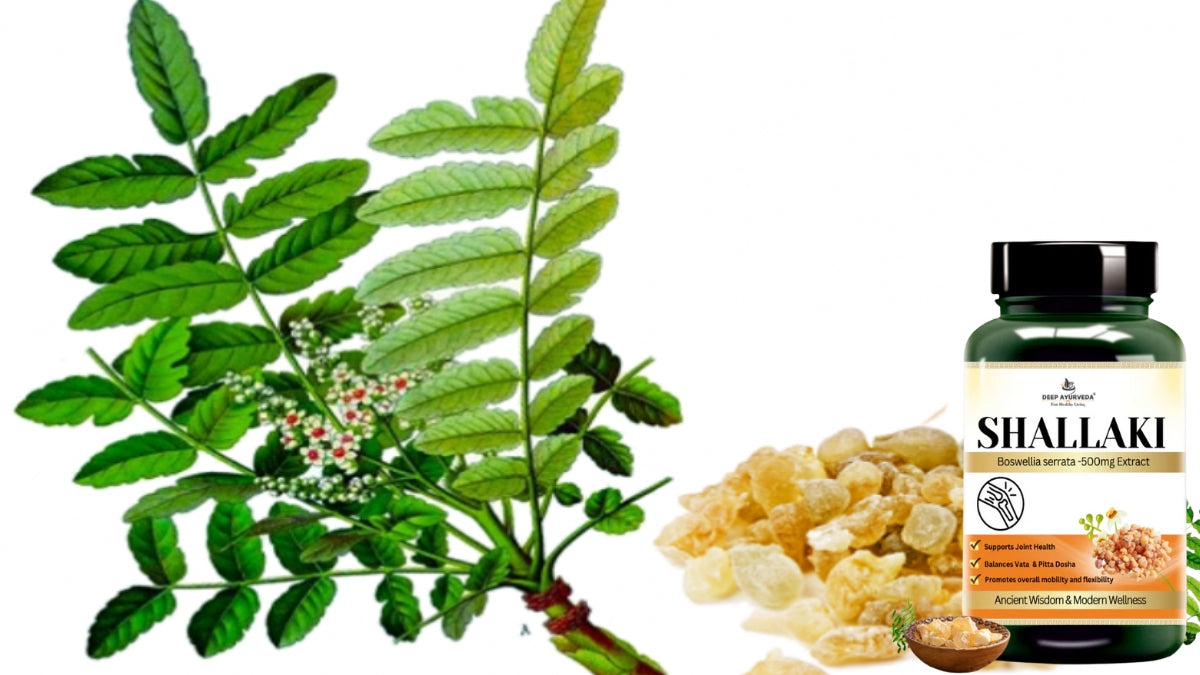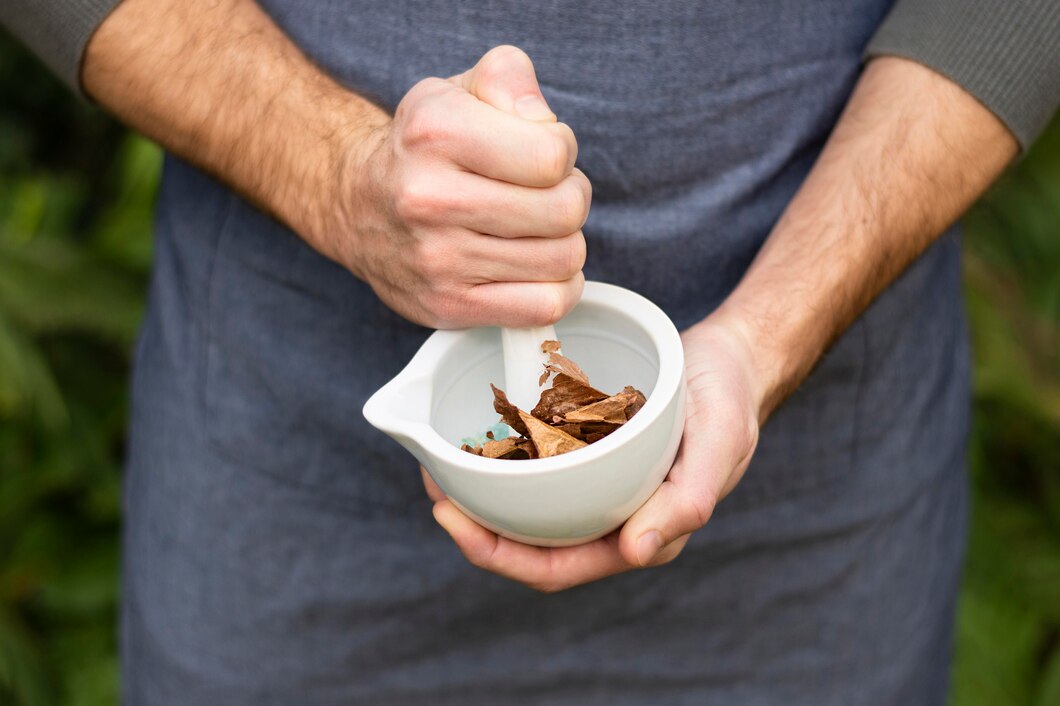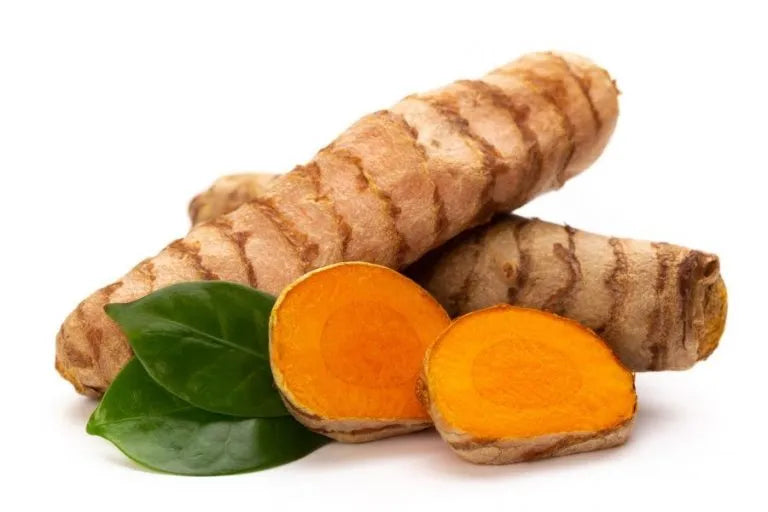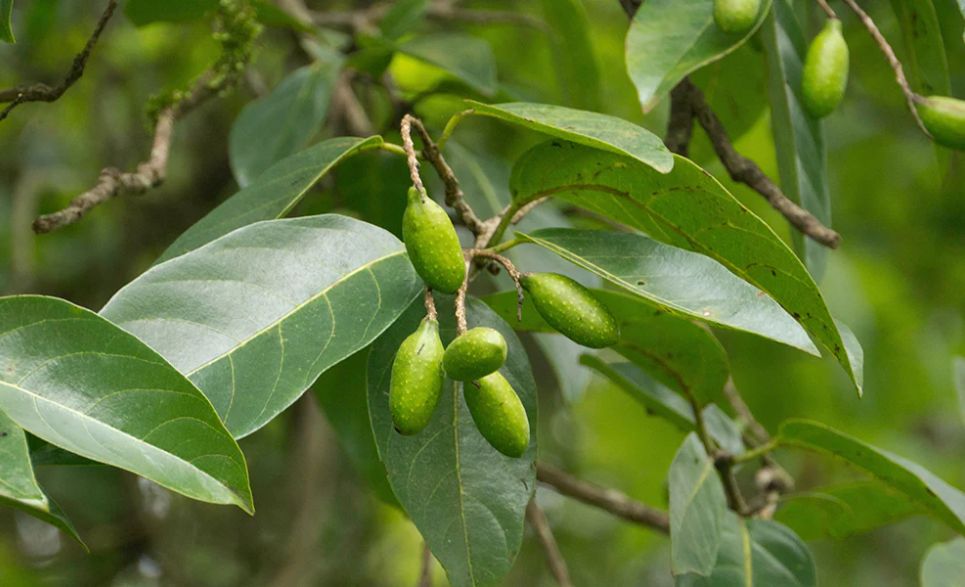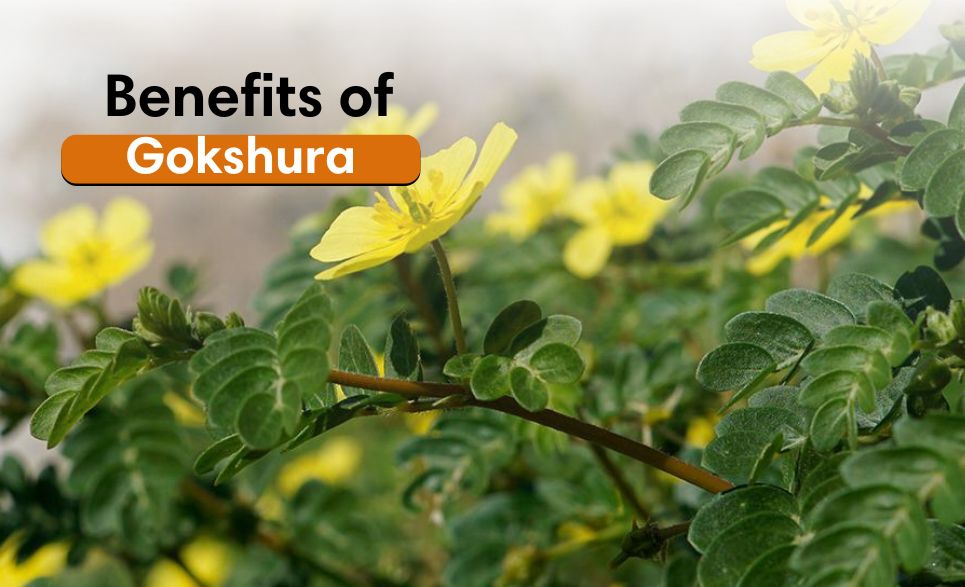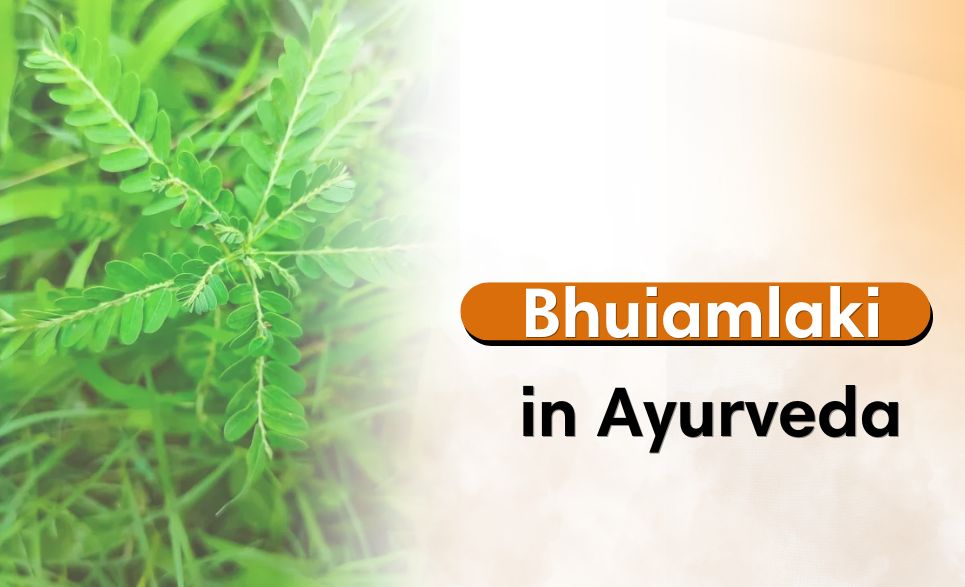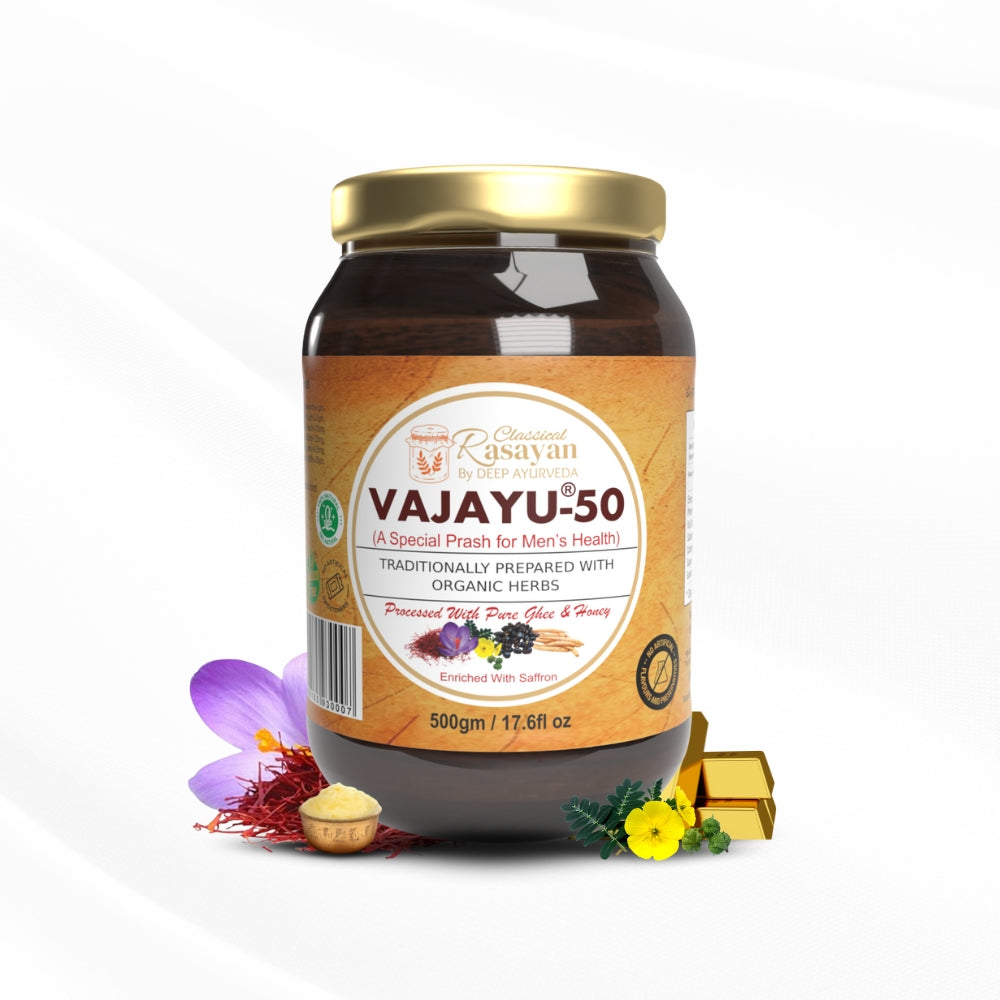Ayurvedic Herbs
Kalmegh: The Ultimate Immune-Boosting Herb You Need to Know About
Kalmegh is a powerful Ayurvedic herb known for boosting immunity, supporting liver health, and fighting seasonal infections. This guide explains its benefits, uses, dosage, and safety in simple, easy-to-read language—perfect for anyone looking for natural wellness.
Read moreAyurvedic Herbs
Shallaki: The Ancient Herb for Modern Health – Unlocking the Power of Boswellia Serrata
Shallaki, also known as Boswellia Serrata, is a revered Ayurvedic herb known for its powerful anti-inflammatory and joint-supporting properties. This post explores how Shallaki helps relieve joint pain, improves mobility, and supports overall wellness naturally. Learn its key benefits, uses, ideal dosage, and precautions to make the most of this ancient herbal remedy.
Read moreTop 6 Ayurvedic Herbs for Weight Gain
Learn about 6 powerful Ayurvedic herbs that support natural weight gain, improve appetite, and boost strength the healthy way.
Read moreBest Ayurvedic Herbs for Male Fertility and Performance
Explore the best Ayurvedic herbs that support male fertility and enhance performance naturally. Learn how time-tested remedies boost vitality, stamina, and reproductive health.
Read moreTop 10 Benefits of Giloy for Immunity, Skin and Overall Health
Giloy, also known as Guduchi, is one of Ayurveda’s most powerful herbs. This post highlights the top 10 benefits of Giloy for boosting immunity, improving skin health, and enhancing overall wellness naturally. A must-read for anyone looking to strengthen their health with Ayurveda.
Read moreHaridra
Haridra, commonly known as Haldi or Turmeric, holds a special place in Indian culture and Ayurveda. Widely used in spiritual rituals and traditional ceremonies like the Haldi function in Indian weddings, it symbolizes purification and prosperity. Revered as "Haridra", "Nisha", or "Gauri", this golden spice is more than a culinary ingredient—it is a powerhouse of medicinal benefits used for centuries in Ayurvedic healing. In Ayurveda, Haridra is revered for its powerful antibacterial, antifungal, and anti-allergic,anti cancerous properties. It is widely used in skincare formulations to promote glowing, healthy skin and to manage various skin disorders. In this blog, we will explore the multiple effects of Haridra on our body—ranging from its powerful healing properties for the skin to its role in boosting immunity, supporting digestion, and balancing the doshas in Ayurveda. Ayurvedic Properties of Haridra Scientific Name-Curcuma longa Family-ZingiberaceaeRasa (Taste): Tikta (Bitter), Katu (Pungent)Guna (Qualities): Laghu (Light), Ruksha (Dry)Virya (Potency): Ushna (Hot)Vipaka (Post-digestive effect): Katu (Pungent)Dosha Action: Pacifies Kapha and Pitta Karmukta- Krimighna – Anti-parasitic and antimicrobialKusthaghna – Useful in treating skin disordersVishaghna – Detoxifying; neutralizes toxinsVarnya – Improves complexion and skin glowShothaghna – Reduces inflammation and swellingVedanasthapana – Analgesic; relieves painLekhaniya – Scrapes away excess fat and ama (toxins)Jwaraghna – Antipyretic; helps reduce feverKandughna – Relieves itchingRaktashodhaka – Purifies the blood Classical Ayurvedic Text References of Haridra हरिद्रा तिक्ता कटुका उष्णा लघ्वी कफवातजित्। कुष्ठशोथविषघ्नी च कन्यकाऽग्न्यनिलापहा॥Haritakyadi Varga, Shloka 163 Haridra is bitter and pungent in taste, hot in potency, and light to digest. It pacifies Kapha and Vata doshas. It is highly effective in skin disorders (Kushta), inflammation (Shotha), and acts as an excellent antidote to toxins (Vishaghni). It also improves digestion and appetite, and alleviates gynecological issues. Benefits Of Haridra 1. Natural Blood Purifier Haridra (Turmeric) is widely recognized in Ayurveda as a powerful Raktashodhaka (blood purifier). It helps eliminate toxins (ama) from the blood, balances Pitta dosha, and supports healthy skin and liver function. In the modern view, turmeric’s active compound curcumin exhibits strong antioxidant and anti-inflammatory properties, which help in detoxifying the blood, improving circulation, and protecting tissues from oxidative damage—supporting its traditional use as a natural blood purifier. 2. Acts as Anti Bacterial and Anti microbial agent Haridra (Turmeric) is well known in Ayurveda for its Krimighna and Vishaghna properties, meaning it helps destroy harmful microbes and neutralize toxins. It is commonly used in treating skin infections, wounds, and allergic conditions due to its natural antibacterial and antimicrobial action. From a modern scientific perspective, turmeric contains curcumin, which has been proven to inhibit the growth of various bacteria, fungi, and viruses. 3. Anti-Allergic and Anti-Inflammatory Haridra (Turmeric) is praised in Ayurveda for its Shothaghna (anti-inflammatory) and Kandughna (anti-itching/anti-allergic) properties. It helps in calming allergic reactions, skin rashes, and inflammatory conditions by balancing Pitta and Kapha doshas. In the modern view, turmeric’s active compound curcumin exhibits strong anti-inflammatory effects by inhibiting inflammatory enzymes like COX-2 and reducing histamine release, which plays a key role in allergic responses. This makes Haridra highly effective in managing allergies, asthma, eczema, and joint inflammation naturally. 4. Improves Digestion In Ayurveda, Haridra (Turmeric) is known to enhance digestion through its Deepana (appetizer) and Pachana (digestive) properties. It stimulates Agni (digestive fire), reduces Ama (toxins), and helps in managing digestive disorders like bloating, indigestion, and worm infestation. Haridra also balances Kapha and Vata, which are often involved in gastrointestinal disturbances. 5. Heals Wounds In Ayurveda, Haridra (Turmeric) is valued for its Vranaropana (wound-healing) and Raktashodhaka (blood-purifying) properties. It is applied topically to promote faster healing, reduce swelling, prevent infection, and support tissue regeneration. Its antiseptic, anti-inflammatory, and astringent actions help cleanse wounds and enhance natural healing.From the modern perspective, turmeric’s active compound curcumin accelerates wound healing by reducing inflammation, stimulating collagen production, and fighting microbial infections. Its antioxidant effect protects the wound area from oxidative stress, supporting quicker and cleaner healing—validating its traditional use in treating cuts, burns, and skin injuries. 6. Acts As Anti Diabetic Owing to its Tikta (bitter) and Katu (pungent) taste, Ushna Virya (hot potency), and Kapha-Medohara properties, Haridra helps reduce excess Meda (fat) and Kapha, which are primary culprits in type 2 diabetes.From a modern standpoint, Curcumin, the active compound in Haridra, exhibits insulin-sensitizing, anti-inflammatory, and antioxidant effects. It enhances glucose uptake, reduces insulin resistance, and lowers oxidative stress, thereby helping in glycemic control and preventing diabetic complications such as neuropathy and nephropathy 7. Acts as Anti Cancerous In Ayurveda, Haridra is revered as a “Vishaghna” (antitoxic) and “Krimighna” (antimicrobial) herb with potent detoxifying and tissue-cleansing properties. It is traditionally used to purify Rakta (blood), eliminate Aama (toxins), and regulate cellular metabolism, which are considered key in preventing the abnormal growth of cells or Arbuda (tumors).Modern research supports Haridra’s anti-cancerous potential, primarily due to its active compound Curcumin. Curcumin exhibits antioxidant, anti-inflammatory, anti-proliferative, and pro-apoptotic effects. It has been found to inhibit the growth of various cancer cells, including breast, colon, prostate, lung, and skin cancers, by disrupting cancer cell signaling pathways, inducing programmed cell death (apoptosis), and preventing angiogenesis (formation of new blood vessels in tumors). 8. Acts as Natural Antioxidant In Ayurveda, Haridra is known to purify the blood, remove Ama (toxins), and enhance Rasa and Rakta Dhatu (plasma and blood tissues), which contributes to better tissue nourishment and disease resistance. Its Tikta (bitter) and Katu (pungent) taste, combined with Ushna Virya (hot potency), helps in neutralizing oxidative stress by enhancing cellular metabolism and eliminating metabolic waste. From a modern scientific perspective, the active compound Curcumin in Haridra acts as a powerful antioxidant. It scavenges free radicals, boosts the body’s own antioxidant enzymes like glutathione, and prevents oxidative damage to DNA, lipids, and proteins. 9. Menstrual & Uterine Support Haridra balances Pitta and Kapha, which are often involved in menstrual imbalances. From a modern view, Curcumin, the active compound in Haridra, exhibits anti-inflammatory, antispasmodic, and hormone-regulating effects. It helps reduce uterine cramps, pelvic pain, and symptoms associated with PCOS, endometriosis, and fibroids. Its gentle action also supports post-partum uterine recovery and hormonal balance without disrupting the natural menstrual cycle. 10. Helpful in Joint Disorders Haridra, with its Tikta-Katu Rasa, Ushna Virya, and Deepana-Pachana (digestive and toxin-clearing) properties, helps in digesting Ama, reducing inflammation, and relieving stiffness and swelling in joints. It also acts as a Shothahara (anti-inflammatory) and Vedanasthapana (pain-relieving) herb, making it ideal for chronic joint disorders. From a modern medical view, Curcumin in Haridra has shown strong anti-inflammatory effects by inhibiting inflammatory mediators like COX-2 and TNF-alpha. Studies suggest that Curcumin can be as effective as some non-steroidal anti-inflammatory drugs (NSAIDs) in reducing pain and improving joint mobility in arthritis, without the side effects commonly associated with synthetic drugs. Conclusion Haridra is more than just a kitchen spice—it is a time-tested Ayurvedic herb with profound healing potential. Integrating Haridra into daily life—through diet, herbal formulations, or external applications—can help you experience its remarkable benefits for immunity, digestion, skin, and overall well-being. Haridra offers holistic wellness backed by both ancient Ayurvedic wisdom and modern science. Incorporating this sacred herb into daily life—whether through diet, supplements, or external application—can be a natural step toward better health and vitality. Let Haridra be your daily ally in the journey toward balance, strength, and inner healing.
Read moreHaritaki: The Ancient Ayurvedic Rasayana You Should Know About
Haritaki is often called the “King of Medicines” — and it lives up to the title. This small, nut-like fruit has held a revered place in Ayurveda for centuries. It’s even the first herb listed in the Ayurvedic texts and is highly praised in Tibetan medicine for its powerful healing abilities. If you’ve heard of Triphala, one of Ayurveda’s most popular formulations, you’ve already encountered Haritaki — it’s one of the three main ingredients. Though its taste is bitter and astringent, the benefits are incredibly sweet — from better digestion and natural detox to sharper brain function and clearer skin. Modern science has also confirmed what Ayurveda knew all along. Haritaki contains potent natural compounds like chebulic acid, gallic acid, corilagin, and ellagic acid, which give it a wide range of therapeutic effects: antioxidant, anti-inflammatory, antimicrobial, liver-protective, heart-supportive, and more. What Is Haritaki? Haritaki grows on a large tree found mostly in the Himalayan foothills, Central India, and parts of Southeast Asia. The fruit is green when unripe and turns yellow to black as it matures. Oval in shape and ridged with lines, it’s the dried version of the fruit that’s used in Ayurveda. Scientific Name: Terminalia chebula Common Names: Harad, Abhaya, Chebulic Myrobalan Family: Combretaceae Ayurvedic Profile of HaritakiTaste (Rasa): Mostly astringent, also bitter, sweet, sour, and pungent (all except salty!) Qualities (Guna): Light and dry Potency (Veerya): Hot Post-digestive Effect (Vipaka): Sweet Effect on Doshas: Balances Vata, Pitta, and Kapha (Tridoshaghna) Key Benefits in Ayurveda: Rasayana: Rejuvenator Deepana & Pachana: Improves appetite and digestion Anulomana: Gentle laxative Medhya: Supports brain and cognitive function Chakshushya: Good for eye health Hridya: Supports heart health Vrishya: Aphrodisiac Top Health Benefits of Haritaki 1. Supports Digestion & Relieves Constipation Haritaki is a gentle, natural laxative that stimulates your digestive fire (Agni). It relieves gas, bloating, and constipation — keeping your gut clean and healthy. 2. Aids in Weight Management By boosting metabolism and cleansing the digestive tract, Haritaki helps eliminate toxins (Ama) that slow down fat burning. It balances Kapha dosha, which is often linked to weight gain and water retention. 3. Detoxifies and Rejuvenates the Body Haritaki acts as a Rasayana, cleansing the blood, repairing tissues, and rejuvenating your cells from within — a true full-body reset. 4. Improves Respiratory Health Its ability to balance Kapha and Vata doshas makes Haritaki effective in clearing mucus from the lungs and easing breathing issues like coughs, colds, asthma, and bronchitis. 5. Promotes Clear Skin and Healthy Hair Its antioxidant and antibacterial properties help fight acne, improve skin tone, and reduce scalp infections. Haritaki also strengthens hair, prevents premature greying, and promotes natural shine. 6. Effective for Piles Its gentle laxative effect helps soften stools and ease bowel movements — making Haritaki a powerful remedy for piles (Arsha) and chronic constipation without harsh side effects. Experience the Power of Haritaki Yourself If you’re ready to try Haritaki and experience these benefits firsthand, we recommend trying the 100% pure and organic Haritaki Powder from DEEP AYURVEDA. Carefully sourced and traditionally processed, it delivers the full healing power of Terminalia chebula just as Ayurveda intended. Whether you use it on its own or as part of a holistic wellness routine, this Haritaki powder can be a trusted companion on your journey to better health. Wisdom from the Ayurvedic Texts “Haritaki is wholesome, rejuvenating, and especially effective in balancing all three doshas.”— Charaka Samhita “It is sacred, improves appetite and digestion, is light to digest, and supports heart and respiratory health.”— Bhavaprakasha Nighantu Final Thoughts Haritaki is more than just a fruit — it's a time-tested remedy that supports your body on every level. Whether you want to improve digestion, boost immunity, cleanse your system, or support skin and hair health, Haritaki is a trusted Ayurvedic ally. Embrace the power of this ancient herb and experience the deep, holistic healing that only Ayurveda can offer.
Read moreTop 7 Health Benefits of Gokshura
Gokshura (Tribulus terrestris) is a revered herb in Ayurveda, often classified as a Rasayana dravya for its rejuvenating and strengthening properties. Known for supporting the urinary system, enhancing male reproductive health, and managing various Vata-Pitta imbalances, Gokshura has been used for centuries in both preventive and therapeutic formulations. Ayurvedic Properties of Gokshur- Botanical Name: Tribulus terrestrisFamily: Zygophyllaceae Rasa (Taste): Madhura (Sweet), Tikta (Bitter)Guna (Qualities): Guru (Heavy), Snigdha (Unctuous)Virya (Potency): Shita (Cooling)Vipaka (Post-digestive effect): Madhura (Sweet)Dosha Effect: Pacifies Vata and Pitta doshas Benefits of Gokshur 1. Gokshura for Urinary and Kidney Health Gokshura (Tribulus terrestris) plays a significant role in the management of kidney and urinary disorders in Ayurveda. It is a well-known Mutrala (diuretic) herb that helps in promoting healthy urine flow and clearing obstructions in the urinary tract. Gokshur is particularly effective in conditions like mutrakruchra (painful urination), mutraghata (urinary retention), and ashmari (urinary calculi/kidney stones). Its cooling and soothing properties reduce inflammation of the urinary tract, while its balya (strengthening) nature helps to tone kidney tissues and prevent recurrence of infections. In addition, it supports the filtration functions of the kidneys and helps in flushing out toxins. 2. Gokshura for Male Reproductive Health Gokshura (Tribulus terrestris) is highly valued in Ayurveda for supporting male reproductive health. It acts as a natural Vrishya (aphrodisiac) and Shukrala (sperm enhancer), helping to improve libido, stamina, and sperm quality. Gokshur nourishes the Shukra Dhatu (reproductive tissue), thereby enhancing fertility and reproductive strength. It is used in treating erectile dysfunction and premature ejaculation. 3. Gokshura for Joint and Muscular Strength In Ayurveda, it is considered balya (strength-giving) and vatashamak (Vata-pacifying), which makes it particularly effective in managing joint pain, stiffness, and musculoskeletal weakness. Gokshur supports healthy muscle growth and recovery. Its anti-inflammatory and analgesic properties help reduce swelling and pain in conditions like arthritis, gout, and backache. By nourishing the mamsa dhatu (muscle tissue) and improving physical endurance, Gokshura aids in maintaining flexibility, strength, and overall musculoskeletal health. 4.Gokshura in Women’s Health Gokshura (Tribulus terrestris) is a valuable herb in Ayurveda for supporting female reproductive and urinary health. It helps regulate hormonal balance, strengthens the reproductive organs, and supports conditions like irregular menstruation, PCOS/PCOD, and infertility. Gokshur acts as a natural balya (tonic) and rasayana (rejuvenator) for women, promoting energy, vitality, and overall well-being. Its mutrala (diuretic) properties help in managing urinary tract infections (UTIs) and reduce water retention, a common issue during menstruation and menopause. Additionally, Gokshura supports a healthy libido and may help relieve menstrual cramps and lower abdominal discomfort. 5.Supports Heart Health Gokshura (Tribulus terrestris) is classified in Ayurveda as Hṛidya—a herb beneficial for the heart. Its unique combination of Madhura rasa (sweet taste), Sheet virya (cool potency), and diuretic action makes it supportive of cardiovascular wellness in several ways. 6.Antioxidant properties Gokshura is rich in several natural antioxidants LIKE Saponins ,Alkaloids and Glycosides that help neutralize free radicals, reduce oxidative stress, and protect body tissues—especially the heart, kidneys, liver, and reproductive organs. 7.Acts as Rasayan With its Madhura rasa (sweet taste), Sheet virya (cool potency), and Snigdha guna (unctuous nature), Gokshura nourishes all seven dhatus, especially Shukra dhatu, thereby improving fertility, vitality, and vigor. As a Balya (strengthening) and Vrishya (aphrodisiac) herb, it is commonly used to promote physical stamina, immunity, and sexual wellness. Additionally, its diuretic and anti-inflammatory properties aid in detoxifying the Mutravaha srotas (urinary system), making it an ideal Rasayana for the urogenital and cardiovascular systems. Conclusion Whether used to manage kidney disorders, enhance fertility, reduce joint inflammation, or rejuvenate the body, Gokshur stands out as a safe and natural remedy that aligns with the Ayurvedic principle of healing from within. Regular use under the guidance of an Ayurvedic practitioner can help restore strength, vitality, and overall well-being.
Read moreBhuiamlaki in Ayurveda: A Natural Healer for Liver and Beyond
In today’s era, liver disorders are increasingly common due to modern lifestyle habits such as poor diet, excessive alcohol consumption, overuse of medications, and exposure to environmental toxins. Conditions like fatty liver, hepatitis, jaundice, and cirrhosis are affecting people at a younger age. In Ayurveda, Bhuiamlaki (Phyllanthus niruri) is highly revered for its potent hepatoprotective action. Known as “Liver’s Guardian,” it helps detoxify the liver, supports bile secretion, and restores liver functions. In classical Ayurvedic texts, it is used in treating conditions like kamala (jaundice), prameha (diabetes), mutrakrichra (painful urination), and even krimi roga (worm infestations). With its wide-ranging therapeutic uses, Bhuiamlaki truly stands out as a multipurpose herb in Ayurvedic medicine. What is Bhuiamlaki? Bhuiamlaki is a small, erect, annual herb that typically grows up to 30–60 cm in height. It is commonly found growing as a weed in tropical and subtropical regions, especially during the rainy season. Scientific Name: Phyllanthus niruriFamily: Phyllanthaceae (formerly classified under Euphorbiaceae)Common Names: Bhuiamlaki (Hindi/Sanskrit), Stonebreaker (English),Bhumyamalaki (Ayurvedic) Ayurvedic Properties of BhuiamlakiRasa (Taste): Tikta (bitter), Kashaya (astringent) Guna (Qualities): Laghu (light), Ruksha (dry)Virya (Potency): Sheeta (cooling) Vipaka (Post-digestive effect): Katu (pungent) Dosha Effect:Bhuiamlaki pacifies Pitta and Kapha doshas Karmukta (Therapeutic Actions) of Bhuiamlaki: Yakrituttejaka (Liver stimulant),Pittashamak (Pacifies Pitta dosha),Mutrala (Diuretic),Krimighna (Anthelmintic),Jwaraghna (Antipyretic),Raktaprasadaka (Blood purifier),Pramehaghna (Anti-diabetic),Shothahara (Anti-inflammatory),Rasayana (Rejuvenative),Aamapachaka (Digestive toxin eliminator. Benefits of Bhuiamlaki 1.Liver Protection & Detoxification- Bhumi Amla helps in managing liver disorders and reverses any damage caused to the liver due to its hepatoprotective, antioxidant and antiviral activities. It helps regenerate damaged liver cells. It is used in conditions like: Jaundice (Kamala) Hepatitis Fatty liver Cirrhosis , and other liver disorders 2. Kidney Stone and Urinary Tract Health- Bhuiamlaki is famously known as “stone breaker” as it reduces the risk of kidney stone formation due to its diuretic property. It does so by promoting the removal of salts (mainly oxalate crystals) that are responsible for the formation of kidney stones. It promotes healthy urine flow and helps in managing: Urinary tract infections (UTI) Renal stones Burning micturition 3. Supports Digestion,Manages Acidity- Its bitter and astringent qualities help improve agni (digestive fire), reduce ama (toxins) ,and pittshamak action reduces acidity and treat: Indigestion Hyperacidity Loss of appetite Worm infestation 4.Manages Blood Sugar (Anti-Diabetic) It might also be beneficial for diabetics as it helps manage blood sugar levels due to its tikta (bitter) and kashay property.It stimulates GLUT-4 translocation in muscle and fat tissues, enhancing peripheral glucose utilization.Bhuiamalki may help protect pancreatic β-cells, responsible for insulin production, especially in Type 2 Diabetes. 5. Antiviral & Antimicrobial Action Research shows Bhuiamlaki has strong antiviral properties, especially effective against Hepatitis B virus, HIV, and Herpes simplex virus. Its extract inhibits viral replication and boosts the body’s defense. 6. Acts as Blood Purifier (Raktashodhak) Since vitiated Pitta is a major cause of blood impurity (Rakta Dushti), Bhuiamalki plays a vital role in correcting blood disorders through its pittshamak action.Liver is the primary site of blood purification, Bhuiamalki indirectly purifies blood by enhancing liver function and bile flow.Hence Bhuiamlaki supports healthy skin by clearing impurities that lead to acne, eczema, and other skin conditions. 7.Anticancer activity An extract of of Phyllanthus Amarus treatment exhibited potent anticarcinogenic activity against 20-methylcholanthrene induced sarcoma development and increased the survival of tumour harboring mice, antitumour and anticancer activity may be related with the inhibition of metabolic activation of carcinogen as well as the inhibition of cell cycle regulators and DNA repair Classical References of Bhuiamlaki in Ayurvedic Texts- भूम्यामलकी तिक्ता कषाया शीतला लघु रसायनी | यकृत्गात्रानिलाघ्नी च पित्तास्रजित् विशेषतः ||Bhavaprakasha Nighantu Bhuiamlaki is bitter and astringent in taste, cooling and light in quality, acts as a rasayana (rejuvenative), is beneficial for the liver and body pains, and especially effective in disorders of pitta and blood impurities. भूम्यामलकी तिक्ता कषाया शीतला लघु शुभा | पित्तास्रकृमिप्रशमाद् यकृद्रोगेषु विश्रुता ||Raja Nighantu It is bitter, astringent, and cooling, with light properties. It is well known for pacifying Pitta, blood vitiation, and worms, and is especially famous in liver disorders. Conclusion In today’s world, where liver disorders, urinary infections, and metabolic imbalances are increasingly common, Bhuiamlaki offers a safe, natural, and holistic remedy. Bhuiamlaki is one of the best Ayurvedic herbs for liver health, detoxification, and kidney care. Whether you’re dealing with jaundice, indigestion, or kidney stones, this rasayana offers holistic healing that is both gentle and effective. Embrace the ancient wisdom of Ayurveda and let Bhuiamlaki support your body’s natural ability to heal and thrive.
Read moreHaritaki (Harad)
Haritaki, commonly known as Harade in India, is a powerful Ayurvedic herb renowned for its numerous health benefits. Rich in vitamin C, iron, manganese, selenium, and copper, it nourishes the scalp, strengthens hair follicles, and supports overall well-being. Benefits of Haritaki ✅ Digestive Health: Improves digestion, promotes bowel regularity, and relieves constipation.💪 Boosts Immunity: Reduces cellular damage and strengthens the immune system with antioxidant properties.🌿 Wound Healing: Speeds up wound healing due to its astringent nature.⚕️ Joint Health: Reduces joint pain and improves bone and tissue health.💡 Brain Health: Enhances cognitive function and supports neurodegenerative disorders. Uses of Haritaki Internal Use: Consumed as powder, capsules, tablets, or decoction for digestive health, immunity, and overall wellness. Topical Use: Mixed with coconut oil for wound healing, acne reduction, and skin irritation relief. Seasonal Use (Ritu Haritaki): Combined with different carrier substances like rock salt, ginger, and honey based on seasonal requirements. Dosage Powder: ¼-½ teaspoon twice daily with water Capsules/Tablets: 1-2 capsules or tablets twice daily with water Decoction (Kwatha): 4-5 teaspoons mixed with water, taken once or twice daily Precautions of Haritaki Excessive consumption may lead to diarrhea. Avoid during pregnancy and breastfeeding without medical advice. Individuals with sensitive skin should mix Haritaki paste with coconut oil before topical application. Not suitable for those experiencing dehydration or excessive dryness. Deep Ayurveda's Haritaki Formulation If you're looking for a high-quality, easy-to-use product to incorporate Haritaki into your daily health routine, Deep Ayurveda's Haritaki Powder and Capsules are excellent choices. Made with pure, natural Haritaki, these products offer a convenient way to enjoy the herb’s benefits. Haritaki Powder ✅ Pure and Natural: High-quality, organic Haritaki with no harmful additives.🌱 Promotes Digestion: Supports digestive health and alleviates constipation.💪 Boosts Immunity: Strengthens the immune system with antioxidant properties.🌿 Skin and Hair Health: Nourishes the scalp, strengthens hair follicles, and clears skin. FAQs Can Haritaki be consumed daily?Yes, Haritaki is safe for daily use when taken in the recommended dosage. Is Haritaki effective for constipation?Yes, its natural laxative properties promote regular bowel movements. Does Haritaki help with skin problems?Yes, it purifies the blood, reduces acne, and supports clear skin. Is Haritaki beneficial for hair growth?Yes, it nourishes the scalp and strengthens hair follicles, reducing hair fall. Can children consume Haritaki?Haritaki should only be given to children under medical supervision. Conclusion Haritaki is a versatile Ayurvedic herb with benefits ranging from improved digestion and immunity to healthier skin and hair. Its rejuvenating properties make it a valuable addition to daily wellness routines. Always consult a healthcare professional before use, especially during pregnancy, breastfeeding, or if taking other medications.
Read more

